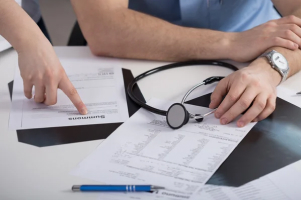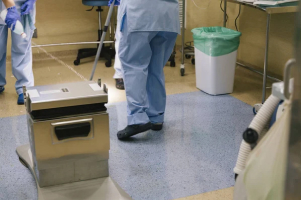
In the complex world of modern healthcare, we trust professionals to provide us with the highest standard of care. Yet, medical errors kill thousands of Americans yearly, making them the third leading cause of death. This post will explore the leading causes of medical error deaths. And illustrate why it is necessary to take action when faced with such a situation.
Are you a victim of a medical error? Taking action and seeking justice is essential. Ryan LLP is here to help you navigate the legal procedure and fight for your rights. Don't let your voice go unheard. Call Ryan LLP today at (216) 600-0308, and let us be your advocate in pursuing justice.

Medical error deaths are a growing concern in the United States. Preventable medical mistakes are now the country's third leading cause of death, following cancer and heart disease.
The Journal of Patient Safety states that medical mistakes claim the lives of 210,000 Americans yearly. But, when you factor in errors of omission and diagnostic errors, that number rises to a staggering 440,000 deaths annually. This equates to more than 1,200 deaths every day.
Medical errors can have severe repercussions for patients. Including increased morbidity and mortality, extended hospital stays, and healthcare costs. Here are some of the most frequent adverse events leading to medical errors:

Hospital deaths range from 40,000 to 80,000 annually due to misdiagnosis or underdiagnosis. This mistake is frequently made in primary care settings where medical professionals:
Technical failures can occur when medical equipment or devices fail to function correctly. Or deliver incorrect results, leading to misdiagnosis or delayed treatment. For example, a patient with an abnormal EKG reading may be misdiagnosed with a heart condition due to faulty equipment.

Medical errors are preventable errors that occur during medical treatment, such as:
A common example is when a patient is given the wrong medication or dose, leading to adverse effects or a delay in treatment.
This refers to breakdowns in communication and information sharing between healthcare providers and departments. For example, a primary care provider may need to communicate important medical history to a specialist. This will lead to a misdiagnosis or inappropriate medical care.

This occurs when there is a delay in identifying a patient's condition or disease. It may cause potential harm to the patient. For example, a patient with cancer may have a delay in diagnosis, leading to a worse prognosis and possible injury.
This involves neglecting to define, properly record, and implement organizational policies across the medical facility.

Poor patient-provider communication and inter-provider communication are communication issues. Poor doctor-patient communication may cause a patient to misunderstand their treatment plan.
Information flow refers to the transfer and availability of patient information, such as medical records and test results. A specialist may not have access to crucial medical history or test results. This will lead to a misdiagnosis or inappropriate treatment.

Patients get healthcare-acquired infections while receiving medical treatment. Often due to inadequate infection control measures. For example, a patient may get a bacterial infection while in the hospital due to improper hand hygiene by healthcare providers.
Staffing patterns and workflow refer to allocating staff and resources and the processes and workflows in place. It can impact patient safety and contribute to medical errors. For example, understaffing may increase healthcare providers' workload, increasing the risk of errors.

Patient-related issues include:
For example, a patient may refuse a recommended treatment due to religious beliefs, leading to a delay in treatment and potential harm.
Medication errors are a serious issue that can occur at any point in the medication process, including:
These errors can harm patients, including adverse drug reactions, hospitalizations, and even death. Medication errors are among the most common medical mistakes affecting millions of patients annually.
Many factors can contribute to medication errors. A patient's health status may sometimes cause medication errors. Or they are underlying medical conditions like heart disease.
Several types of medication errors can occur, including:
Dosage errors
It can occur when a patient is given too much or too little medication. Dosage errors can occur due to various factors, such as:
Administration errors
This can occur when medication is given via the wrong route or at the wrong time. For example, a drug intended to be given orally may be administered intravenously by mistake.
Medication interactions
This can occur when two or more medications interact in a way that may lead to adverse effects. This can be especially dangerous for patients with complex medical conditions taking many medications.
Wrong medication
A patient might be given the wrong medication for various reasons, such as:
Consider a medical malpractice lawyer if a medication error injures you or a loved one. Medical malpractice lawyers can assist you in understanding your legal options and determine if you are also entitled to compensation for your injuries and losses.

Medical errors can seriously affect patients and lead to legal action against healthcare providers. Four elements must typically be proven to establish a legal claim for medical malpractice: duty, breach, causation, and damages.
If all four elements are established, the patient may be able to recover compensation for their damages.
In medical malpractice cases, damages are intended to compensate the patient for the harm they have suffered due to the healthcare provider's negligence. The damages that may be available in medical error cases include:
Economic damages
These damages are meant to compensate the patient for any financial losses they have suffered due to the medical error, such as:
Non-economic damages
These damages are meant to compensate the patient for intangible losses, such as pain and suffering, emotional distress, and loss of enjoyment of life.
Punitive damages
In some cases, punitive damages may be awarded in addition to economic and non-economic damages. Punitive damages punish the healthcare provider for their reckless or intentional conduct and to deter others from engaging in similar behavior.
It's important to remember that medical malpractice cases can be complex and must need the help of an experienced attorney.

The stress of dealing with medical malpractice can affect every aspect of your life, from your ability to work and support your family to the quality of your relationships. The longer you wait to seek justice, the more difficult it becomes to gather crucial evidence and build a strong case.
The experienced medical malpractice attorneys at Ryan LLP are here to help. We'll help you through the legal procedure with our years of medical malpractice lawsuit experience. So you may heal and rebuild your life, we'll fight for your compensation.
Don't let medical malpractice rob you of your future. Contact our medical malpractice attorney at Ryan LLP today for initial case consultation and take the first step toward justice.